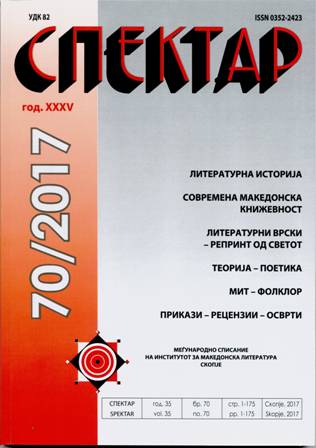НАРАТИВНИОТ ДИСКУРС ВО РОМАНОТ ИСКУПУВАЊЕ
НА ИЈАН МЕКЈУАН
THE NARRATIVE DISCOURSE IN IAN MCEWAN’S NOVEL ATONEMENT
Author(s): Kristina KostovaSubject(s): Studies of Literature, Theory of Literature
Published by: Институт за македонска литература
Keywords: narrative discourse; narration; focalization; temporal prolepsis; heterodiegetic
Summary/Abstract: This paper is focused on Ian McEwan’s bewildering play with the narrative of his novel Atonement. In Atonement, McEwan succeeds in his attempt to combine narrative techniques in a dexterous manner, which is why this novel is a narrative masterpiece. The novel consists of four parts, each with a different narrator. McEwan’s employment of narrative devices compels the reader to be constantly active and appraise the text as a literary artefact. There are several changes in the prose style. The purpose of the narrative discourse is not only to draw the complex storyline by setting the scene, describe the details, or highlight the incidents, but also to set a balance between the physical and psychological aspects at hand. Atonement is a piece of conventional fiction with an intriguing and pleasant plot that captivates its readers emotionally
Journal: Спектар
- Issue Year: 2018
- Issue No: 70
- Page Range: 81-93
- Page Count: 13
- Language: Macedonian

